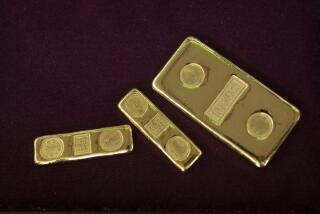Bush Rebuffed on Currency Market Plan : Finance: The President suggests using a market basket of commodities, including gold, to help determine the value of major currencies.
- Share via
WASHINGTON — Gold, the mystical metal, should play a greater role in calming world currency markets, George Bush believes. But persuading America’s major economic allies to go along with the idea may not be easy.
The idea received a less-than-enthusiastic response Monday from many finance ministers and central bank presidents at the annual meetings of the International Monetary Fund and World Bank.
The President caught many by surprise when he suggested in a speech Sunday that one way to alleviate turmoil in currency markets would be to use a market basket of commodities, including gold, to help determine the value of major currencies.
Bush called this commodity basket “an independent reference point” that would help strengthen global economic cooperation.
Administration officials insisted that Bush was not trying to return the United States to the gold standard, whereby the value of the dollar would be tied to the price of gold.
Instead, they said the President saw this approach as a way to allow the world’s major industrial countries to determine whether their currencies were properly valued by measuring their purchasing power against a set collection of commodities.
The only specific commodity mentioned by the President was gold, although Administration officials said the value of such products as wheat or oil could also be included.
The proposal would give gold a standing in currency affairs that it has not had since 1971, when then-President Richard Nixon suspended the convertibility of dollars into gold.
That marked the first step in the eventual breakdown of fixed currency exchange rates. Fixed rates were replaced in 1973 with the current system in which the values of the dollar and other major currencies are allowed to float, with their exchange price set by the open market.
While some finance officials said they would have to know more details before they could comment on Bush’s proposal, Helmut Schlesinger, the head of the powerful German central bank, gave the idea a quick brushoff.
“There are many disadvantages to such a currency construction, and I won’t be pushing for it in my short term in office,” said Schlesinger, who is scheduled to retire as Bundesbank president a year from now.
While others replied more diplomatically, no one endorsed the idea.
Michel Camdessus, managing director of the International Monetary Fund, said it would be impossible to act on the proposal at this year’s meetings, but he called Bush’s suggestions “useful and worthwhile” for study.
French Finance Minister Michel Sapin jokingly told reporters that the main discussion he had heard about the proposal involved just what date it was last put forward by the United States.
“There was some debate as to whether it was made in 1985 or 1986. We came to the conclusion that it was 1985, but there were some differences of opinion and the debate goes on,” Sapin said.
Actually, the idea was first raised by then-Treasury Secretary James A. Baker III at an IMF annual meeting in 1987 as a way to improve economic policy coordination among the seven richest industrial countries--the United States, Japan, Germany, France, Britain, Italy and Canada.
A senior Administration official, speaking to reporters on condition of anonymity, said the new proposal would seek to raise the profile of the commodity basket and link it more closely to currency decisions.
More to Read
Get the L.A. Times Politics newsletter
Deeply reported insights into legislation, politics and policy from Sacramento, Washington and beyond. In your inbox twice per week.
You may occasionally receive promotional content from the Los Angeles Times.










